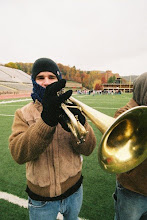A: Out Of The Dust
B: Hesse, Karen
D: Scholastic, 1997
E: Realistic Fiction, Newberry Medal Winner
F: 4-6
G: Billie Jo was born to a family living in Kansas before the dust bowl. Her mom was pregnant with another child, around the same time as the worst of the dust bowl settled in. They had a rough time on the farm, nothing would grow and they were not doing well. One thing that helped Billie Jo was playing piano. Her mother taught her to play and she was good, she even got paid to play at times. One morning in July 1934, Billie Jo’s father left a can of kerosene next to the stove and her mother thought it was water, poured it into a pot, it caught fire, her mother ran out to get her dad, but Billie Jo tried to toss it out the door and it hit her mother. It burned her bad and burned Billie Jo’s hands when she tried to put it out. This killed her mother and newly born baby brother, this lead to a riff between her and her father. Billie could not play the piano well anymore and her father was pulled away from everything around him. All the while, dust storms were coming and going and rain was nowhere to be found. Eventually Billie Jo needed to escape and ran away, but she soon returned. When she got back, her relationship with her father became a lot better. He father also found a new lady and was falling in love. Billie Jo cam to like her and the story ended with them all happy again.
H: This is a book that has so much more in it that I first expected. I never expected a book about the dust bowl to include such happiness, arts involvement, tragedy, and so many other emotions. This book had some shock value to it also. Some emotions and situations just appeared suddenly, while others festered for a long time. I can defiantly say that nothing in this book was predicable.
It started slow and I took a long time to get settled into the story, free verse poetry does that to me. Billie Jo is a wonderful piano player; this is what first got me drown into the story. I was then shocked as this taken was taken as fast as her mother and brother. This was the turning point for me. The book went from a nice story about a bad time to a tragedy in a horrible time. I was engulfed in emotion when Billie Jo tossed the burning pail out the door and hit her mother by accident. This is an unfortunate even that could happen to almost anyone.
I was also wrapped up in the dealings between Billie Jo and her father after her mother died. A wall was built between them and neither one knew how to tare it down. The poetry added to the feeling. It provided just enough detail to give you a picture, but vague enough to keep you guessing and to let you add in some details. This made the book an easy read that also provided a wonderfully vivid story.
I thought this book was awesome and defiantly has potential to be used in a classroom.
I: I think this book would be a great way to teach what the dust bowl was and how it affected the people who lived at that time. I also think it would be a great way to help students see how families deal with tragedy and what it can do to a family. This book would also be a great way to teach free verse poetry. Most students are afraid of poems, but reading this book will help them to see that poetry is not a scary thing.
Saturday, April 19, 2008
Subscribe to:
Post Comments (Atom)

1 comment:
Yes, this book certainly evokes emotion. I think you are right, the brevity of the free verse really draws you into the essence of the story. Each word is meaningful and you really feel Billie Jo's pain...both physical and emotional. Thank you for your response Adam. What about finding some web sites or other links to this book, the Great Depression, or more specifically, the Dust Bowl? I would like to see more effort in the teaching ideas. You provide the thematic connection, just dig a little deeper :)
Post a Comment